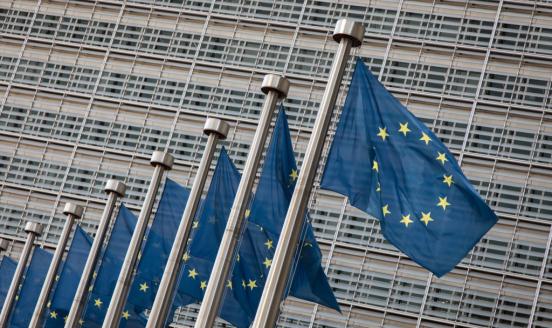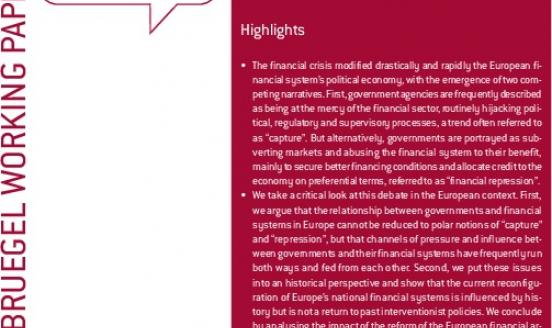The Weekender
Dear All,
The writing of this weekender has been the occasion of a number of internal debates and disagreements with other colleagues at Bruegel. I have to stress once more that the views herein are mine and that they are not those of Bruegel as an institution and that they do not reflect those of my fellow researcher here. I hope nonetheless that they will provoke some debate with our community and stir some ideas for future research.
It is another of those weekends filled with uncertainty. The relief provided by the agreement between Greek political leaders is likely to be very short lived because despite the extraordinary goodwill of the Greek political leadership, very few people believe that this deal and its likely weak implementation can return Greece to solvency.
But financial markets need to wake up to other sorts of risk. Tension in Syria is escalating in a way that makes intervention inevitable (despite Russian and Chinese veto in the security council). This will question further the role of Turkey in this fragile regional equilibrium. In addition, the risks of an Israeli strike on Iran have increased substantially in the last few months. Such an event would most probably be far more devastating for the global recovery than a Greek default.
That being said, I will focus on:
- The Greek deal: Lagarde and Draghi’s moment
- Middle East and a possible strike on Iran
1. The Greek deal: Lagarde and Draghi’s moment
With some slightly optimistic assumptions (that do not reflect the recent WEO update and the acceptance that there are more downside risks to the global economy), Poul Thomsen (the mission chief for Greece) and his team manage to find a declining debt/GDP to somewhere around 120%, allowing them in principle to sign a staff level agreement for a new Greek program.
The reality is that even inside the IMF staff and executive board, a number of people are skeptical about this. Europeans themselves do not seem to believe that this adjustment is realistic or that the Greek can deliver what they put in their new Letter of Intent Letter of Intent.
This was pretty much the conclusion of their Eurogroup meeting on Thursday night. It seems that secretly, in European and IMF circles, there is some hope that the Greek parliament will push back the deal struck by their political leadership so as to avoid everyone the embarrassment of signing off a deal it knows doom to fail.
Yet this is probably not going to happen, although there are already a number of defection (16 from LAOS, 5 from Pasok and 16 from New Democracy), the coalition would still win the vote by some 65 votes but this margin could drop sharply during the debates and ahead of the vote scheduled to take place today at 10pm London time.
In practice, even if everyone seems to know that this new program has limited chance of success, nobody is ready to pull the plug on Greece and precipitate a default/restructuring through CACs in March. The argument often used is that both European and international safety nets are not operational and wouldn’t be able to contain contagion.
For the record, I have been a long supporter of this line of thinking. I thought for a long time that there was some value in waiting both for Greece to undertake some reforms and for the euro area as a whole to improve its safety nets. Even though, it was clear since the beginning of 2011, that Greece’s position was unsustainable, Europe didn’t have a clear safety net framework for Ireland, Portugal and other fragile countries and no disclosure on banks holdings of these debts, which could have precipitated large bank runs.
More than 2 years after the Greek crisis has erupted, the situation is very different. Portugal and Ireland are under a program, the EFSF has been created, the ESM has been signed, the ECB has tacitly agreed to play a larger role in sovereign debt markets through its SMP. The IMF has created new tools that can be used in Europe and is in the process of raising new resources. There was therefore some value in waiting.
The reality is that we will not get much more solid safety nets and firewalls than the ones we have now. The ESM will probably be made a touch larger at the March European Council but it will not be changed altogether and regardless of its size it may not be the appropriate tool to deal with Italy or Spain. So the value of waiting, which I defended for months, has now dwindled completely, and someone brave needs to take the responsibility for allowing Greece to reduce its debt sharply and someone smart needs to manage the rippling consequences for euro area. This is clearly a responsibility for the IMF’s Managing Director and the ECB president.
When this is done a few things will need to happen fairly quickly, probably in the following order:
- The Governing Council of the ECB will need to come out immediately with the boldest possible statement about its commitment to ensure the integrity of the euro area, its ongoing support for the ELA in Greece and a clear framework to replace defaulted Greek debt for other eligible collateral in order to guarantee some functioning of financial intermediation in Greece. (A failure to do so would then force the Bank of Greece to print euros or an alternative currency and leave the euro area).
- The Greek government, by tapping the EFSF, will be authorized to recapitalize and take complete control of one or two large Greek banks that it will operate as utilities. The EFSF could stand behing the Greek government in a new program that will allow the government guaranteeing Greek’s term and sight deposits so as to limit capital flight and safeguard the payment system. (The ECB and the EFSF should appoint executive board members to these banks given the absence of a European FDIC).
- The Troika will have to immediately announce a new, and larger program for Portugal so as to prove with force that the Greek case was indeed a unique case. This is the best way to stave off contagion.
- The IMF will accelerate its fundraising with the help of the Mexican presidency of the G20 so as to sign a large increase in its resources by June.
- The Paris Club would also need to draft a new framework for debt reduction of claims to the official sector in order to reduce further Greece’s debt burden against some policy conditionality.
I believe we have come to the point where there is no more value in waiting and where it is actually the lingering of the Greek uncertainty that is now the principal source of systemic risk. If a Greek debt reduction is implemented swiftly with appropriate safeguards so that the integrity of the euro area is not at risk, financial stability can actually improve. This is Lagarde and Draghi’s moment. She would need to call the current program off, he would have to accompany this decision by taking the bold actions that need to go along a default inside a monetary union.
This will probably not happen because both Lagarde doesn’t want to be responsible of this failure and because the ECB is not ready to deal with the consequences of a Greek default for it has no plan to avoid its consequences on the rest of the euro area.
The ECB needs to have either an unwavering commitment to the integrity of the euro area or a plan for an orderly exit of one or more countries:
- In the former, it needs to agree to expand the collateral pool infinitely, show no discomfort with the ELA and the growing balances in its Target 2 payment system.
- In the latter, the ECB and the eurogroup will need to work on a plan to introduce capital controls around all peripheral countries overnight should it prove needed. If panic were to set in, either in anticipation or after the exit of a euro area member, such controls would be the only way to restore some degree of financial stability and prevent an unraveling of the euro area. Those controls would need to be introduced simultaneously in all the countries and not one country after the other to prevent a domino effect. If one country was to leave the euro area or if such a risk was to rise substantially, runs in other peripheral countries could only be mitigated by firm capital controls. These would be temporary and could only be justified for prudential reasons and would therefore require the approval of the ESRB given capital controls are specifically outlawed by the Lisbon Treaty (no escape clause inside the euro area).
- Both options carry important risks and run against its ethos and its prerogatives. But a failure to do one or the other puts the future of the euro area at risk.
2. Middle East and a possible strike on Iran
The Israeli and US administration have had long held disagreements over the best way to cope with Iran’s nuclear ambitions. There are growing signs that Israel is increasingly ready to strike despite the US belief in the effectiveness of its additional round of sanctions. There was a very detailed account of the state of play on this matter in Israel in an excellent article in the NY Times magazine by Ronen Bergman.
Ultimately, it is unlikely that an agreement can be found between the two administrations under Obama’s presidency and the question is whether Israel can go alone if it feels the window for a strike is closing.
President Ahmedinajad stated yesterday that it would make an announcement soon “of Iran’s very important and very major nuclear achievements”. This is likely to increase the tension between Israel and the United States on the necessity to strike.
If such a strike was to occur in the months to come, which appears increasingly likely, the consequences for the world economy could be devastating. Oil prices have shot up in recent weeks but they do not quite reflect the risks associated with such a strike. This is probably the single largest risk to the economy now. Far greater than a Greek default…
Shahin Vallée


